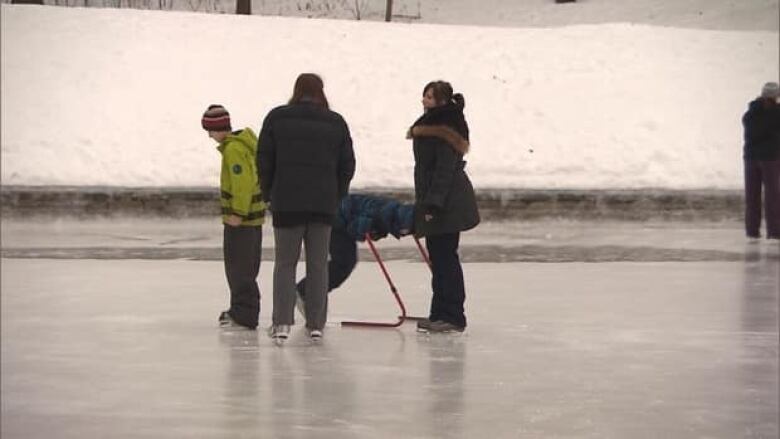More skating rinks kept cool artificially

An extended January thaw in parts of Quebec and Ontario has put a major dent in the outdoor hockey season. But an increasing number of municipalities, responding to fluctuating temperatures, are now using artificial refrigeration to keep their skating rinks frozen through the winter months.
Unseasonably mild weather and rain over the past few days in Montreal has turned the city's outdoor rinks to slush. The only ones with a hope of remaining operational are equipped with cooling systems below the ice, including several built with the help of a local charity.
"We wanted to make sure we could maximize the use of the rinks," Geneviève Paquette, executive director of the Montreal Canadiens Children's Foundation, said of the decision to use artificially-cooled ice.
"We realized when we started in 2007-2008 that there were a lot of issues with regards to the weather."
The charity has helped build four rinks around the city, with another one soon on the way.
Another Montreal neighbourhood, Westmount, has set up an artificial outdoor rink as a temporary replacement while its new arena gets built. The rink is operational up to about 8 C.
Some warmer cities, like Toronto, have been using cooling systems for years. More than 50 of the city's outdoor rinks are compressor cooled, which makes it possible for them to operate in a range of weather conditions.
Ottawa also opened an artificial outdoor skating rink last year with the help of their own NHL team, the Senators.
The technology may become essential to extending Canada's favourite winter pastime.
A study released last March said that outdoor hockey is being threatened by climate change. The study, co-authored by a McGill University professor Lawrence Mysak, said that ice rinks were opening later over and closing earlier in the year.
The hardest hit regions are the Prairies, southeastern British Columbia, southern Ontario and Quebec, according to the study.
François Bilodeau, whose Sherbrooke, Que.-based company specializes in skating rink cooling systems, said interest in the technology continues to grow.
In recent years, LeProhon Group has set up temporary skating rinks for festivals like the winter carnival in Quebec City.
It has also installed low-budget cooling systems for rinks in northern Quebec, New Brunswick and Nunavut, where indoor community rinks that once relied on sub-zero temperatures now require an air cooling system.
"It seems like every week we get new demands," said Bilodeau, the company's director of development.
"It's quite costly but at least your citizens can skate for three or four months."